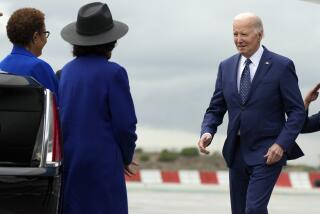Clinton Removes Export Limits on Encryption Technology
- Share via
WASHINGTON — The Clinton administration decided Thursday to allow U.S. companies to export highly sophisticated technology that protects information sent between computers.
The decision opens a multibillion-dollar market to the American high-tech industry, which argued it was losing business to European competitors.
But Atty. Gen. Janet Reno said the increased ability to scramble data “will mean that more terrorists and criminals will use encryption” to hide illegal activities. As a result, the administration said it would seek greater funding to fight computer terrorism in other ways.
Led by Silicon Valley, advocates for less restricted sales overcame years of objections by the FBI and a Pentagon intelligence agency fearful that the technology would help terrorists, other criminals and foreign adversaries hide their communications and also allow hackers to tap into the data of legitimate computer users.
President Clinton was under increasing pressure to relax the administration’s long-standing reluctance to permit the sales. The House of Representatives is nearing action on a widely supported measure urging him to open the foreign markets, and the information technology industry is exercising increasing political clout as the 2000 presidential campaign arrives.
“The bottom line is, this is a battle for the hearts and minds of the high-tech community,” said one technology lobbyist and former Commerce Department official pleased with the decision.
Experts said the ultimate value of the decision would go far beyond the sales of the encryption technology.
The technology is the equivalent of the lock on the front door of a house. Without a lock, the house would have limited value and would be difficult to sell. With a relatively low-cost lock in place, the contents of the house are secure, and the value of the house increases tremendously.
The technology is expected to increase e-commerce and computer networking by making communications more secure--whether they involve the purchase of books or airline tickets by credit card, or the transmission of corporate plans from a headquarters in California to a branch office in Singapore.
“It’s a giant, qualitative leap forward,” said Wade Randlett, political director of Technology Network, an association representing 140 companies in the technology industry.
At the same time, he said, “it’s a big win for Al Gore. There had been significant grumbling the administration was not in the right place on encryption policy. A lot of the onus for progress was placed on the vice president’s shoulders.”
Gore has placed himself at the center of the development of the administration’s information technology policies. He has worked assiduously--and now in the face of a challenge for Silicon Valley support by Texas Gov. George W. Bush, a rival for the presidency--to present himself as the candidate most comfortable with the new computer economy.
Previous policy allowed Americans to buy the most powerful data-scrambling technology. But foreign buyers could not. Because manufacturers were loath to make different products for different markets, they sold only the most powerful versions that foreign buyers could purchase.
James B. Steinberg, Clinton’s deputy assistant for national security affairs, alluded to the internal debates within the administration, which had been taking place for more than two years, when he said, “We found that there is no ‘one-size-fits-all’ solution to the issue of encryption.”
“We have crafted a new strategy that allows industry to compete effectively with foreign competitors while protecting our national defense, security and law enforcement interests,” he said.
Federal law enforcement officials have long argued that in the hands of mobsters, kidnappers, narcotics traffickers and terrorists, unbreakable encryption devices, particularly high-quality American technology, threaten public safety.
Indeed, Reno, at the White House for the announcement of the policy shift, said, “In stopping a terrorist attack or seeking to recover a kidnapped child, encountering encryption might mean the difference between success and catastrophic failure.” But she also said the technology was “critically important” in protecting privacy.
An FBI source said the agency accepted the White House decision because it provides “a meaningful technical review before any stuff goes out the door.” But, he added, determining the end users is not always possible.
The decision announced Thursday blocks Iran, Iraq, Libya, Syria, Sudan, North Korea and Cuba, nations accused of supporting terrorism, from purchasing the technology.
Even as he expressed support for the sale of American encryption software, FBI Director Louis J. Freeh said in a speech in July, “We think the American people . . . would like to be assured that if a federal, state or local judge orders the discovery and seizure of a conversation or a record, based on probable cause, then that order will succeed.”
In recent years, some of those most adamant about blocking the export of sensitive technology found themselves urging the administration to relax the controls.
Stephen Bryen, a deputy undersecretary of Defense during the Reagan administration, said foreign adversaries and criminals could easily obtain encryption devices and computer codes from non-American sources.
“The Europeans offer it. The Israelis offer it. The Chinese have it,” he said.
In short, said Richard Perle, another former senior Pentagon official, “The controls were not helping at all.”
Times staff writer Robert Jackson contributed to this report.






